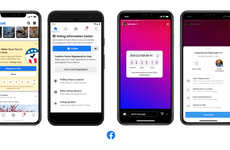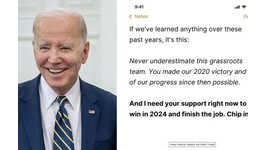
Social Networking to Win Votes
Bianca — April 21, 2007 — Pop Culture
References: timminspress
Savvy Canadian politicians are turning to online social networking sites like Facebook to connect with younger voters. Others, like Timmins, Ontario MP Charlie Angus, aren't quite there yet.
“Moving to Facebook is something we have thought about.â€
Instead of creating a Facebook profile, Angus wants to work on his website, updating it with more audio and visual content. He says he'll leave Facebook for parliament members in bigger cities.
This could be a huge mistake, and leave him eating his competitors' dust.
NDP leader Jack Layton joined Facebook and has almost 2,000 “friends.â€
Think that's impressive? Liberal Leader Stephane Dion has added over 5,000 buddies on Facebook. Trailing far behind is Elizabeth May from the Green Party; she only has 200 on her list. But hey, at least she's keeping with the times.
MPP Gilles Bisson, on the other hand, is so out of the loop, he doesn't even know what Facebook is. “Is it like one of those blogs?â€
After posing the embarrassing question to The Daily Press, he further diminished his opportunities of connecting with a younger audience. “I'm not into that: We've been looking into technology and how we can use it, but we've never gone into those blog sites.â€
As the Timmins Daily Paper reported, “Politicians from all parties have been creating profiles on the site recently.â€
Want to add your party's leader to your contacts? Be wary. Just like there are fake celebrities on social networking sites, so too are there people posing as politicians. There are several Stephen Harper profiles out there, for example.
Coun. Gary Scripnick confirmed his profile is real, although he hasn't added a photo or any other personal information yet. His son is helping him with the account.
Following in his dad's footsteps, he's also “created a network for young Liberals.†Scripnick thinks it's a good tactic for the upcoming provincial election.
Timmins Mayor Tom Laughren understands why local politicians are joining, but he also told the Timmins Daily Paper he has no plans to create a profile of his own.
“We do live in that age and (eventually) there's going to be a generation that does everything online.â€
In the U.S. political leaders have already caught on to the trend, including Senator Jim Webb.
Are they just trying to appeal to a younger demographic, or could the truth be that these leaders are as hooked on social networking sites as the rest of us?
“Moving to Facebook is something we have thought about.â€
Instead of creating a Facebook profile, Angus wants to work on his website, updating it with more audio and visual content. He says he'll leave Facebook for parliament members in bigger cities.
This could be a huge mistake, and leave him eating his competitors' dust.
NDP leader Jack Layton joined Facebook and has almost 2,000 “friends.â€
Think that's impressive? Liberal Leader Stephane Dion has added over 5,000 buddies on Facebook. Trailing far behind is Elizabeth May from the Green Party; she only has 200 on her list. But hey, at least she's keeping with the times.
MPP Gilles Bisson, on the other hand, is so out of the loop, he doesn't even know what Facebook is. “Is it like one of those blogs?â€
After posing the embarrassing question to The Daily Press, he further diminished his opportunities of connecting with a younger audience. “I'm not into that: We've been looking into technology and how we can use it, but we've never gone into those blog sites.â€
As the Timmins Daily Paper reported, “Politicians from all parties have been creating profiles on the site recently.â€
Want to add your party's leader to your contacts? Be wary. Just like there are fake celebrities on social networking sites, so too are there people posing as politicians. There are several Stephen Harper profiles out there, for example.
Coun. Gary Scripnick confirmed his profile is real, although he hasn't added a photo or any other personal information yet. His son is helping him with the account.
Following in his dad's footsteps, he's also “created a network for young Liberals.†Scripnick thinks it's a good tactic for the upcoming provincial election.
Timmins Mayor Tom Laughren understands why local politicians are joining, but he also told the Timmins Daily Paper he has no plans to create a profile of his own.
“We do live in that age and (eventually) there's going to be a generation that does everything online.â€
In the U.S. political leaders have already caught on to the trend, including Senator Jim Webb.
Are they just trying to appeal to a younger demographic, or could the truth be that these leaders are as hooked on social networking sites as the rest of us?
Trend Themes
1. Political Social Media Presence - Politicians are using social media platforms like Facebook to reach potential younger voters who are more likely to engage with online content, which could pave the way for social media marketing opportunities for politicians.
2. Fake Political Accounts - Politicians need to be cautious of fake celebrity accounts on social media platforms like Facebook, which opens up opportunities for the development of techniques to detect and block fake accounts.
3. Generational Shift Towards Online Activities - Politicians need to realize that there is a generation now that can also vote that prefers to do everything online, indicating a potential shift towards an era of exclusively online political engagement and the need for politicians to adjust their engagement methods to accommodate this shift.
Industry Implications
1. Social Media Technology - The rise of social media platforms like Facebook for political engagement creates opportunities in social media technology to increase engagement and enhance user experiences for political targets.
2. Digital Marketing and Advertising - The increasing use of social media platforms like Facebook for political engagement could lead to growth in Digital Marketing and Advertisements for political campaigns and advocacy groups looking to attract the younger demographic.
3. Political Consulting Industry - The increased use of social media platforms like Facebook in politics creates an opening for the growth of political consulting firms looking to advise and strategize social media-driven political campaigns and advocacy groups looking to attract and engage with the younger demographic.
3.3
Score
Popularity
Activity
Freshness























